After years of building WordPress websites, we’ve learned how important it is to have a local WordPress setup on your computer.
Having WordPress on your personal machine lets you experiment with new features without risking your live site, dive deep into WordPress development, and even build entire websites before they go live. It’s like having a private sandbox for all your WordPress projects.
If you’re a Windows user, there are numerous ways to set up WordPress locally. But we’ve narrowed it down to the two easiest methods. In this guide, we will show you how to easily install WordPress on a Windows computer, no matter which version you’re using.
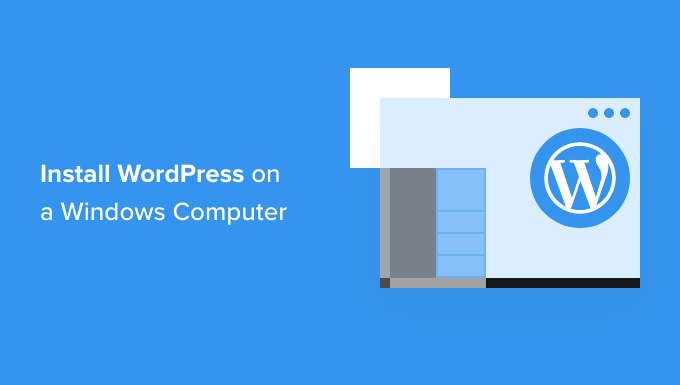
Why You Should Install WordPress on Windows?
If you’re a Windows user, then installing WordPress locally on your computer offers several benefits.
A local WordPress installation creates a testing environment that doesn’t affect your live website. This setup, often called a local server or localhost, is your personal playground for WordPress.
WordPress developers regularly use local installations for their work. For instance, they may use it to experiment with new plugins or themes or test the site before updating to the Gutenberg block editor.
But it’s not just for the pros. If you’re new to WordPress, a local setup is perfect for learning. You can explore features, test themes and plugins, and experiment freely without worrying about breaking a live site.
It’s important to note that when you install WordPress locally on Windows, only you can see the site. If you want to create a public website, then you’ll need a domain name and web hosting.
Now, technically, you can install WordPress on Windows using XAMPP, and we’ve written a tutorial on it before.
That being said, we’ve found 2 even simpler ways than XAMPP for setting up a local WordPress environment, making them great for beginners or users who need to create a local site quickly. You can click the link below to jump ahead to any method you’re interested in:
Method 1: Install WordPress on Windows Using Studio (Quick and Simple)
For the first method, we will use Studio. It’s a local WordPress software made by Automattic, the company that manages and runs WordPress.com, which is a website builder based on the WordPress software.
We will talk about this method first because it’s much quicker and simpler to follow, making it perfect for complete beginners.
First, you need to open the Studio by WordPress.com website. Then, click on the ‘Download for Windows’ button.
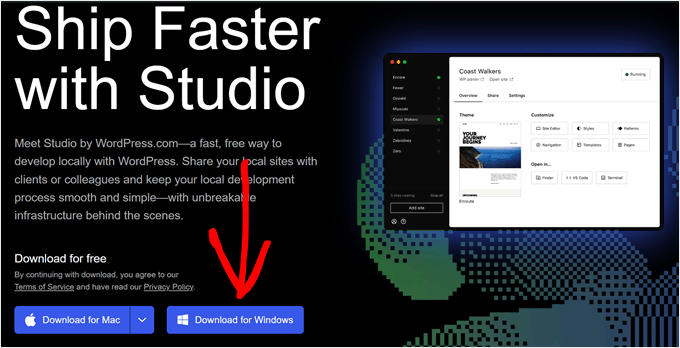
Once you’ve done that, just open the downloaded file to start the installation.
A popup window will now appear, showing you that the application is being installed.
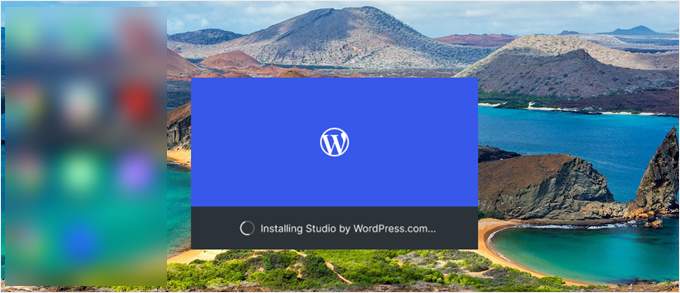
With that done, you can add your first site.
To do this, just enter your new local WordPress site name and click ‘Add site.’ You can name the site however you like so long as it helps you easily identify it.
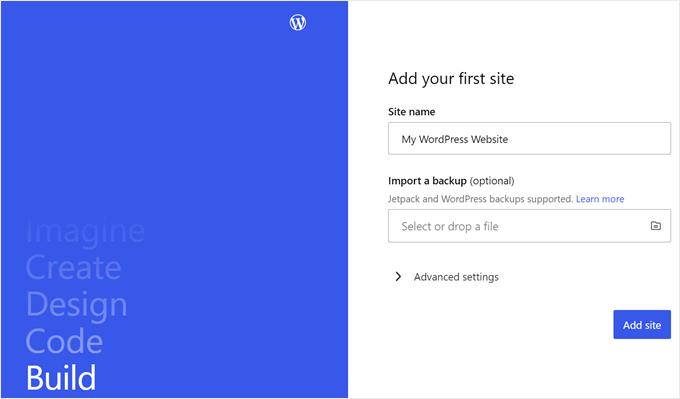
You should now see your local WordPress site dashboard.
To access your WordPress dashboard and edit your website, just click the ‘Start’ button at the top right corner. This will make your local website accessible to you on your computer.
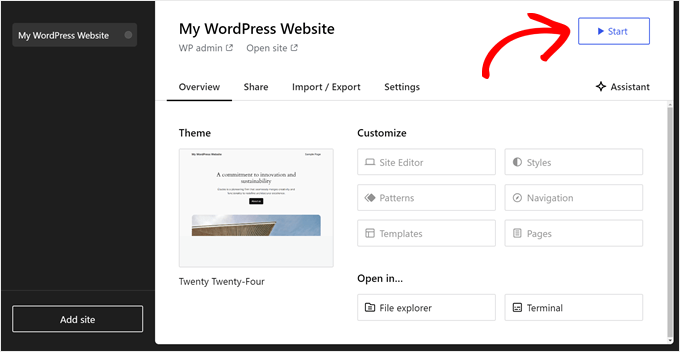
Once the ‘Start’ button changes to ‘Running,’ you can click on the ‘WP Admin’ link at the top left side of the page.
This will bring you to your local WordPress admin page.
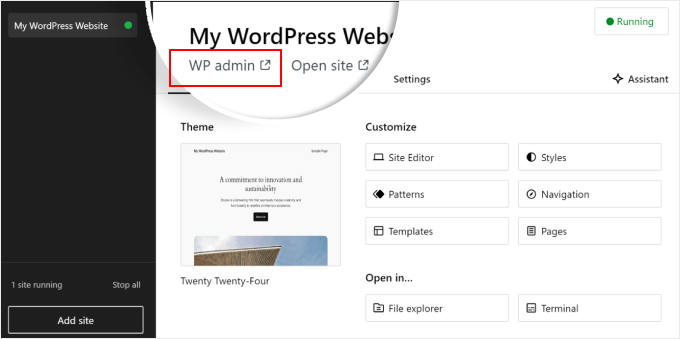
And that’s pretty much it for the setup. Let’s explore the other settings that may be necessary as you build your local website.
As you can see in the ‘Overview’ tab, you can immediately access the WordPress full-site editor menu right from the Studio dashboard. You can also click ‘File explorer’ to open your WordPress website’s folders and files and click on ‘Terminal’ to manage your website using WP-CLI.
If you switch to the ‘Share’ tab, you can log in to your WordPress.com account, clone your local website, and upload it to WordPress.com’s servers. This will temporarily make the cloned site online, which is useful for sharing demo sites with your clients or team members.
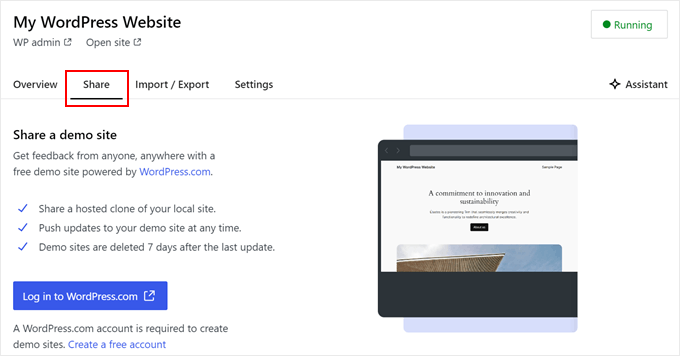
At times, you may want to log in to your local website directly through your browser instead of using Studio. In that case, you need to know your wp-admin credentials.
To find them, you can switch to the ‘Settings’ tab and find your WordPress admin username, password, and login URL there.
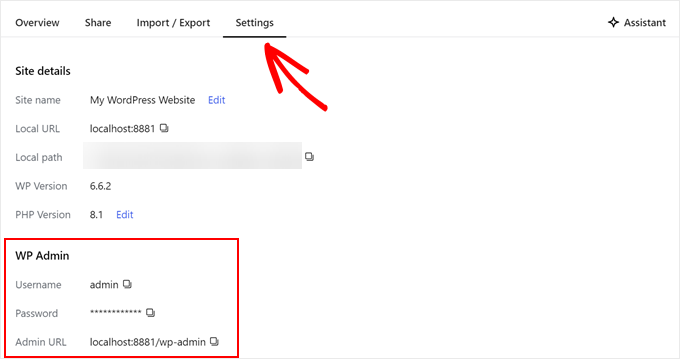
Another neat feature of Studio is its built-in AI chatbot, which you can communicate with by clicking on the ‘Assistant’ button.
Here, you can ask Studio for help with tasks like updating all your plugins at once, updating your core WordPress version, or creating code for a custom block.
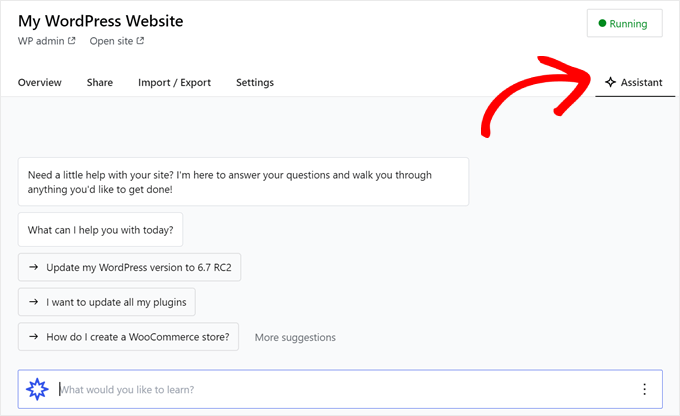
When you’re done working on your local site, just hover over the ‘Running’ button at the top right corner until it says ‘Stop.’
Then, click on the button to stop the website.
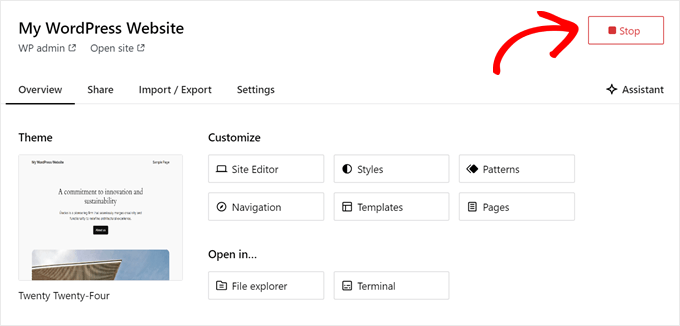
One downside of Studio is you cannot configure the WordPress environment to your liking. This means you need to use the PHP version, web server, and database that have been pre-selected for you.
This can be a drawback if you need to test your website or plugin with specific server configurations.
If you require more control over your local WordPress environment or need to match your local setup with a specific live server configuration, then you can check out the next method using Local WP.
Method 2: Install WordPress on Windows Using Local WP (More Customizable)
First, you need to download and install the Local WP software on your Windows computer. Simply go to the Local WP website and click the ‘Download for Free’ button.
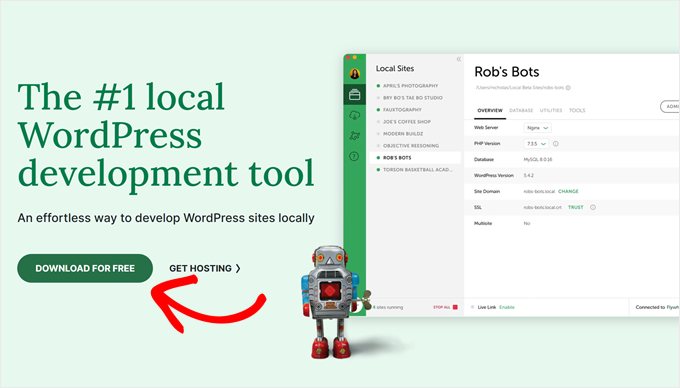
After that, a popup window will appear where you’ll need to select your platform. Go ahead and choose ‘Windows’ from the dropdown menu.
Next, you can enter your details like first and last name, work email address, and phone number to download the software.
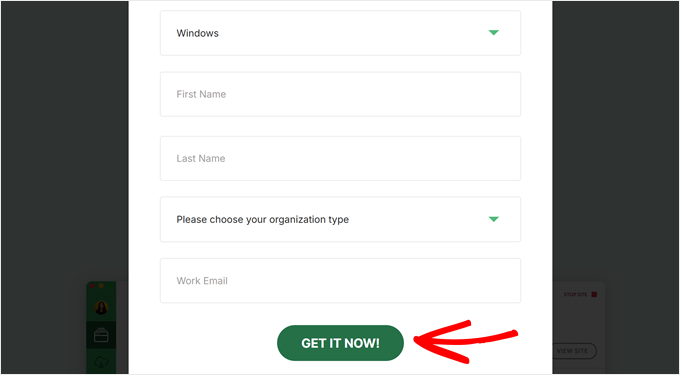
Upon entering the details, simply click the ‘Get it Now’ button.
After that, the software will be automatically downloaded into your computer. Otherwise, you can click on the ‘click here’ link to start the download.
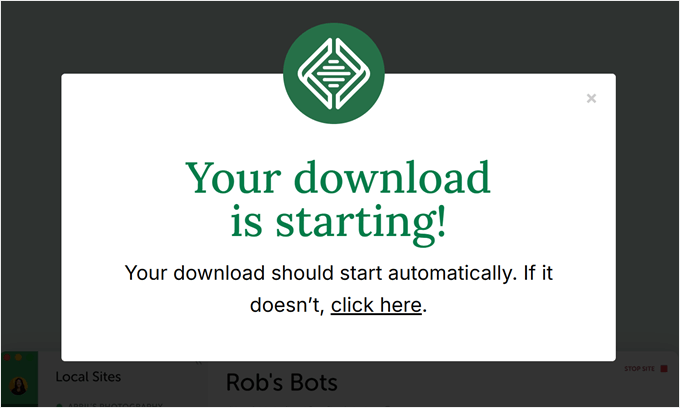
Once the file is downloaded, go ahead and launch the setup wizard.
Now, you’ll need to select whether you’d like to install the software for all users or only for you.
Once you’ve selected an option, click the ‘Next’ button.
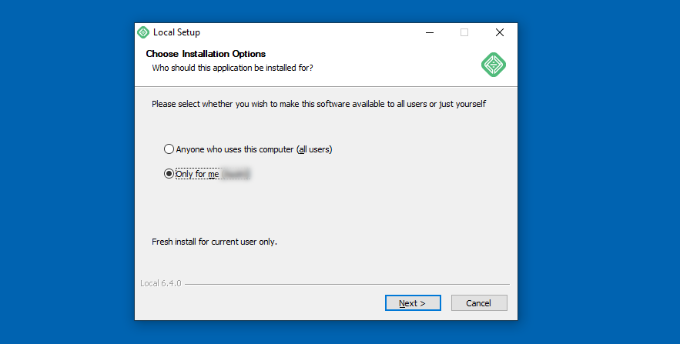
In the next step, you can select the ‘Destination Folder’ where the software will be installed.
Simply click the ‘Browse’ button to set the path and then click the ‘Install’ button.
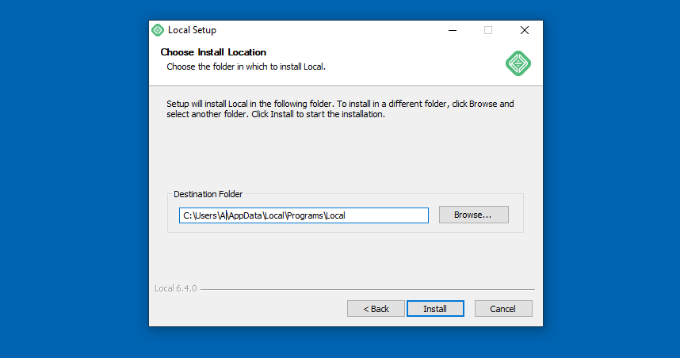
The Local WP software will now install on your Windows computer.
Once it’s done, you can check the ‘Run Local’ checkbox and click the ‘Finish’ button in the setup wizard.
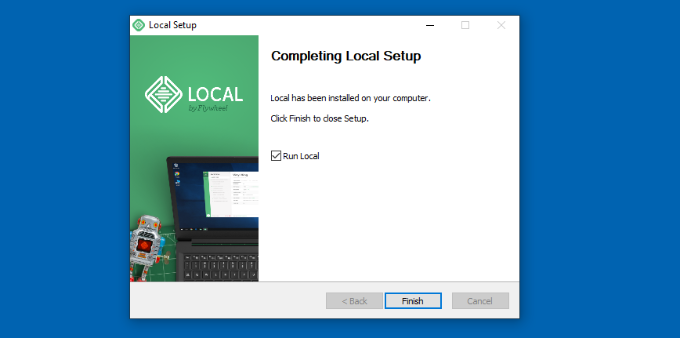
The software will now launch on your Windows device.
The next step is to add a new local website. To do that, simply click the plus ‘+’ button at the bottom.
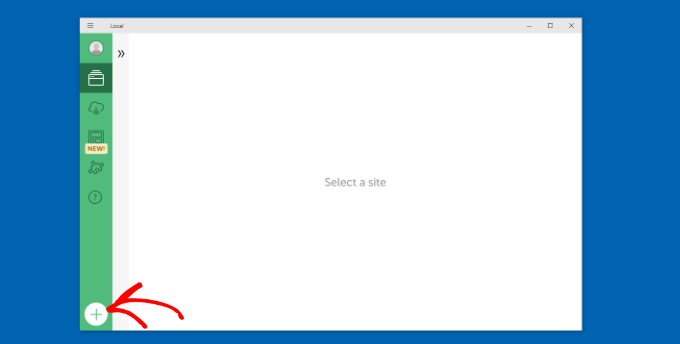
After that, you can create a site in the Local software.
Select the ‘Create a new site’ option and click the ‘Continue’ button. There are also options to create the site from a blueprint or an existing website file, but we’ll go with the first option for the sake of demonstration.
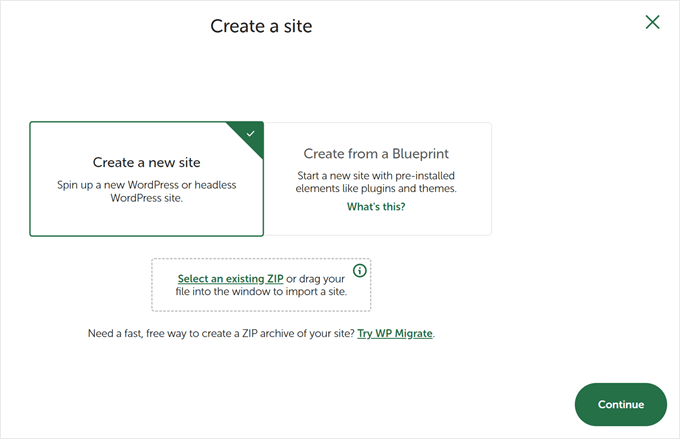
Next, you can enter a name for your local website, like ‘My WordPress Website.’
There are also advanced options where you can enter the local site domain and local site path. By default, the domain will use your website title but separated with dashes.
Once you’re done, simply click the ‘Continue’ button.
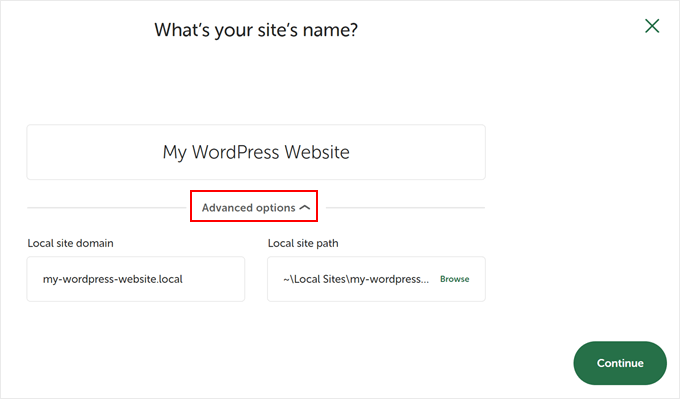
After that, you will need to choose an environment for your local website.
You can use the ‘Preferred’ environment where the software will automatically select the PHP version, web server, and MySQL version. On the other hand, you can also select ‘Custom’ and enter the environment details.
Local WP offers the latest PHP versions. As for the web server, you can choose between Nginx or Apache. You can also select between MySQL or MariaDB for the databases.
Do note that some PHP, web server, and database versions require downloading some dependencies for them to work properly.
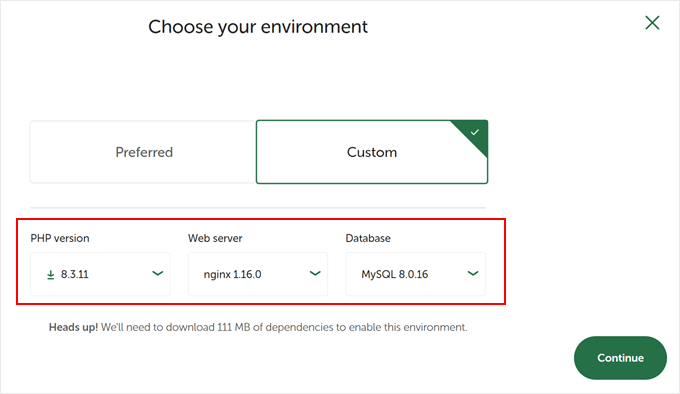
Next, you can enter a WordPress username and password for your local website. Plus, there’s also an option to choose a WordPress email address where you’ll receive all the email notifications.
Other than that, there is an advanced option where the software will ask whether you have a WordPress multisite network. If not, just click ‘No.’
After entering these details, simply click the ‘Add Site’ button.
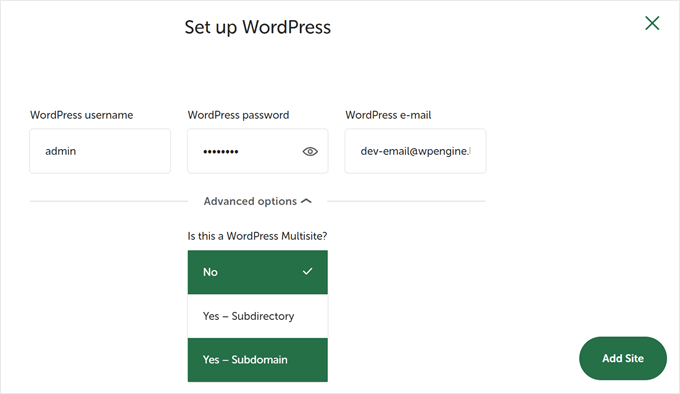
The software will now install WordPress and set up your website.
To launch the local website, go ahead and click on the ‘Start site’ button at the top right corner.
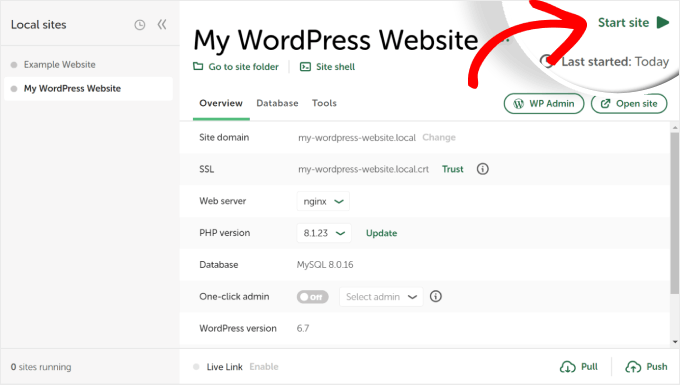
Next, click on the ‘WP Admin’ button, and you’ll see the WordPress admin login page.
Simply enter the username and password you entered earlier when setting up the local website, and then click the ‘Log In’ button.
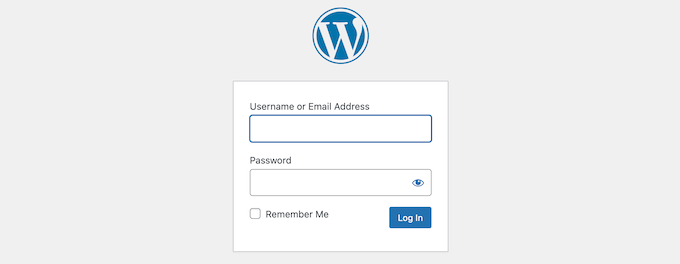
You can now edit your local website on your Windows computer.
When you’re done, don’t forget to stop the website from the Local WP software by clicking the ‘Stop site’ button.
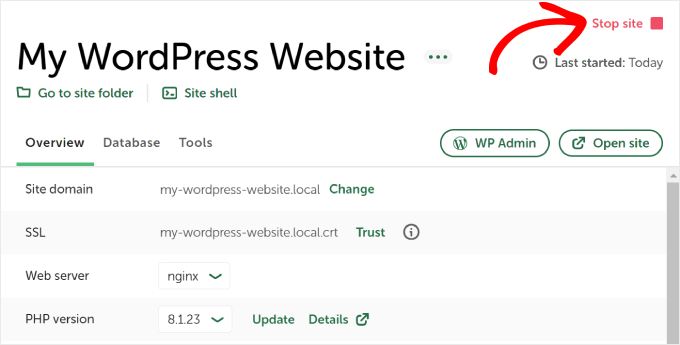
Pro Tip: If you want to skip the login process, you can enable a one-click admin login in Local WP.
To do this, just go back to the Local WP dashboard and toggle the ‘One-click admin’ button until it says ‘On.’ Then, in the dropdown menu, select the admin user that can use this one-click login feature.
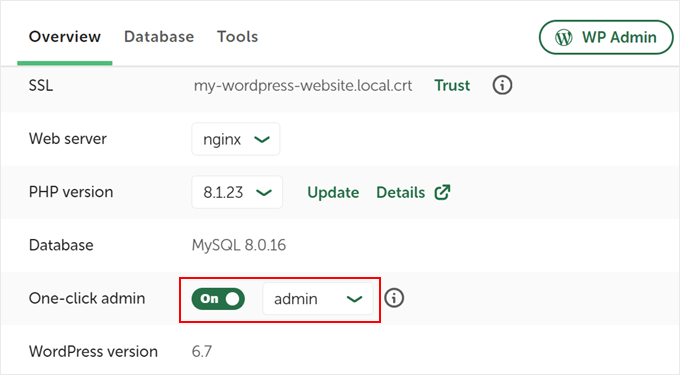
Alternative: Use WordPress Playground to Test Themes, Plugins, and More
WordPress Playground is an innovative tool that lets you experiment with WordPress directly in your web browser. It’s a virtual sandbox where you can try new WordPress themes, plugins, and features without affecting any real website.
WordPress Playground differs from a local WordPress environment in several key ways.
First, it doesn’t require installation on your computer and resets after each use, unlike permanent local setups. You can access it from any device with a browser, while local installations are tied to one computer.
While WordPress Playground is ideal for quick tests and learning, a local WordPress environment on your Windows computer offers more flexibility for long-term development projects.
For a detailed walkthrough, check out our guide on how to use WordPress Playground in your browser.
I’ve Installed WordPress on My Windows Computer, What Now?
Now that you have WordPress on your computer, here are some things you can do:
- Learn basic WordPress tips and tricks to use your site better.
- Try different WordPress themes to see how your site can look.
- Install and test must-have WordPress plugins to add new features to your site.
- Learn how to fix common WordPress errors on your own.
- Try different drag-and-drop page builders to make your site look nice.
- Learn how to reset the WordPress admin password on localhost to recover access to your site.
- Set up automated workflows to make managing your site easier.
- Learn about WordPress security to keep your site safe from hackers.
- Move your local WordPress site to a live server when you’re ready to share it with everyone.
We hope this article helped you learn how to install WordPress locally on a Windows computer. You may also want to see our article on how to install WordPress locally on a Mac computer and our ultimate guide to creating a WordPress staging site.
If you liked this article, then please subscribe to our YouTube Channel for WordPress video tutorials. You can also find us on Twitter and Facebook.





Thomas
Great tutorial! I’m trying to download a wordpress site to a local copy. I’ve based my self on this tutorial. So far this is what I’ve done right (I think…):
1- I’ve downloaded all the files from the live website using FileZilla to wamp/www/mysite/.
2 – I’ve exported, downloaded and zipped the live site database.
3 – Using WAMP>phpmyadmin I’ve created a new database and imported the zip file (from 2)
4- Changed the wp-config.php and updated the database name, user and password.
Now at this point, I’m able to see the homepage when I type http::/localhost/mysite. The them has been rest however. Also, the admin side as far as I can tell works perfectly.
The main problem I’m getting is that apart from the homepage I get 404 errors for all the other pages on the local site.
I’m not sure what I’m doing wrong! Thanks in advance!
George
Thanks so much. I have everything up and running. Very helpful. I would not have been able to do this on my own.
maggie
xampp is good for wordpress .It supports max range of url and all
maggie
thanks… It was helpfull and easy
karis
Been postponing this with the misconception that the process is tedious and takes time. Wow, thanks to you, I am now done. So easy. Thanks again for the good work. May it never go unrewarded.
Dmitry M
Thanks for the tut, very easy to follow.
Naaz
great..!! was as simple as 1+1 :p
Marty
Excellent, worked 110%. Thanks dude!
Bob S
This was an awesome tutorial! Thanks for the help
Faisal Masood
Thanks for sharing the nice WordPress resources.
Sabine Blackburn
Have it all installed but can not create a database in MyphpAdmin, it shows ‘No Privileges’ where the create button should be
Any suggestions?
David
After following your instructions, I got everything right except when I wanted to log in with the “root” username. When I log in, I get this message ” #1045 Cannot log in to the MySQL server”. Please what should I do?
WPBeginner Staff
Try to log in with blank password if that does not work you would need to reset root password for your MySQL server.
pran
how to change the root password
Gabriel Popov
Thanks, this article was really useful.
Omar
Amazing!! thanks a ton!!
Aaron
Downloaded everything. I can access wordpress but need to create a database for wordpress. When i click on phpmyadmin it takes me to a 403 forbidden error saying You don’t have permission to access /phpmyadmin/ on this server. I cant figure it out.
Annie L
Hello – your tutorial rocks. I’m able to get pass the 5 min setup and land on the Wordpress login page.
One issue, after entering the same credentials provided in the 5-min setup (/wordpress/wp-login.php), I get “SSL connection error.”. Looking at the wp-login.php file, it forces a redirect to SSL.
How do I get around it without installing a SSL locally?
Running Wamp 2.4, Windows 7, Chrome browser.
lubna
really help tutorial bro.I just cant log in to word after the successful installation Help.
Miriam
I think your tutorials are clearer than anything else I find for a newbie like me. Thanks!
Can you offer any suggestions for my problem creating a database? I already have a WP site under Bitnami. I decided to download WAMP to have multiple WP sites using WAMP. After installing WAMP, when I open phpMyAdmin I get a log in window. If I log in using the username/pswd originally set up (with Bitnami installation) it says I don’t have priveliges to create a database. I can log into phpMyAdmin using the usename/pswd from the Bitnami WordPress site and I have priveliges but it gives me a 1044 Error when I try to create a new database. I am not sure what to try next. Thanks in advance for any suggestion you may have.
Miriam
I figured out that problem and am on to a different problem. After installing WAMP and putting WordPress in c:WAMP/WWW… I open a browser and try http://localhost/mysite/ but get a 404 Not Found. Could this be related to the fact that I already have Bitnami/localhost? Thanks!
Win
You didn’t paste it in the www folder. You can’t post it in the main wordpress file — you have to navigate to the www folder and paste it next to the index.html file. This should fix your 404 error problem
Merom
Hi,
I am facing the same problem. what exactly should I paste to www?
thanks
IBAS
I really found this tutorial so helpful to me, thanks for the efforts
Kriss
Wamp Server is an outdate program died on 2013. Probably it is not the best for wordpress
Laurent Lafont
You are not saying what the username and password are when launching phpmyadmin! And all web searches are giving dummy information as well….. So now stuck…. very useful instructions indeed…….
Win
Username: Root
Password: Blank
Helen Magner
Thanks for the instruction. It worked well. I have had a wordpress site up and running for a year now. but now but I would like to be able to import it to to local site so that I can write and save wile I cannot connect to the internet and publish when I can get back on line. Thanks for your help.
ludovic
Simply perfect. Merci !!!
Robert
When i follow the steps wampserver to myphpadmin I get the login page, not the page which allows me to click on the database tab as shown in your very well written tutorial. Suggestions to get the wp-config.php file set up?
Dave
I had the same problem, just leave the password blank & you’ll get in.
Psdfreak.com
On that login page fill Username: “root” and press login (no password required)
Maryam Jamil
thanks alot
your article really helps
Dharmesh Joshi
Thanks you bro…(Y)
Vivi
Hey! Really helpfull article, But… I can’t log in in wordpress..Firstly , in the step of installing wordpress i was directed in a blank page( logo only) , then i reloaded and said it has allready been istalled, so i procceded with the log in, but it seems that my account is not valid..nothing workd..not even the e-mail for getting a new pswrd .
What should i do? I allready copied the steps twice from the beggining with different databases and data.
nel
your tutorial worked PERFECTLY
ty
Andy
Please help . Thanks
installed WAMServer, as according to your instructions, I chose phpMyadmin, and I encountered this error msg, “HTTP Error 404.0 – Not Found
The resource you are looking for has been removed, had its name changed, or is temporarily unavailable.
Detailed Error Information
Module IIS Web Core
Notification MapRequestHandler
Handler StaticFile
Error Code 0×80070002
Requested URL http://localhost:80/phpmyadmin/
Physical Path C:\inetpub\wwwroot\phpmyadmin\
Logon Method Anonymous
Logon User Anonymous”
I installed and re-installed WAMServer, but encounter the same error, how do I proceed from here?
farah
Hi, Thank you for great tutorial, I am facing an issue please help me to solve the issue. After successful installation of WAMP, when I have clicked on PhpMyAdmin , It is asking me to login , but i dont know what is my username and password that can be used here?
Regards
Farah
WPBeginner Support
Try username root and leave password field blank
Admin
Barbara
I had the same error and other sites had very complicated and, frankly, unsuccessful suggestions on how to fix it. Thank you for this clear and simple solution – it worked!
KarSho
Simple, Clear and Helped.
Thanks Dude…
zubekk
thanks dude………..!
Sara
Hey there! I installed WampServer like you said but when i press phpmyadmin it opens a blank chrome webpage. No database menu or anything like the printscreen you showed. it’s just blank. I’ve tried unistalling and installing again but it remains the same. help!
WPBeginner Support
Where do you press phpMyAdmin? Try accessing it using the url http://localhost/phpmyadmin/
Admin
Sara
I pick the WampServer icon out of the taskbar and pick the phpmyadmin just like in your printscreen. No, that didn’t work either. I don’t know what can be wrong!
Sara
Ok, reboot the system and It opened something on the phpmyadmin but it’s asking me login and password!
Omer
Hi. Although this article is helpful, however I would like to give some suggestions in improving it. There are some fill in the blanks in this article which makes it difficult to install wordpress.
1. After instructing on installing Wamp Server 2, you immediately jump to phpmyadmin where as you should have told that we need to install mySQL -service- install service and start it. Then we have to install apache – service – install service and start it. Then after making sure that the wamp icon is green head over to the phpmyadmin.
2. After opening the localhost site, you didn’t mention that the username was “root” and password was blank for the database site and jumped immediately on creating database through database tag.
Apart from that it was great effort.
hujat ul islam
can you help me in installing word press on xampp
sumit
while installing wamp server it wll shows error again and again.. . error is about MSVC3100.dll file error.. . kindly fix this error
LIsa
I installed wamp successfully, renamed database, installed wordpress, entered all fields and then once I hit the final “install wordpress”, got a weird blank screen with the wordpress logo at the top. When I hit the “back button” it said wordpress was already installed so I tried entering the username and password and it says it is not found. I tried entering the email I had entered to reset the password and says it isn’t found. I tried using the instructions above for changing the password within the phpmyadmin found the Wp-users file in my database and clicked on pencil icon to edit users and it says “my sql returned an empy result” … help!
Lisa Tomsio
Never mind … I just deleted wordpress installation, created a new database and started over and it worked. I had unchecked the “allow search engines …” on the wordpress page the first time so I left it checked the second time and it worked fine. Thanks for this information!
Campbell
I installed WAMServer, as according to your instructions, I chose phpMyadmin, and I encountered this error msg, “HTTP Error 404.0 – Not Found
The resource you are looking for has been removed, had its name changed, or is temporarily unavailable.
Detailed Error Information
Module IIS Web Core
Notification MapRequestHandler
Handler StaticFile
Error Code 0x80070002
Requested URL http://localhost:80/phpmyadmin/
Physical Path C:\inetpub\wwwroot\phpmyadmin\
Logon Method Anonymous
Logon User Anonymous”
I installed and re-installed WAMServer, but encounter the same error, how do I proceed from here?
yousef mayeli
hi there
i installed many times with different options but same problem,it’s icon appears and when i click it to proceed it doesn’t appear anything. i don’t know what should i do.just disappointed
yousef mayeli
i installed wamp and its icon came on desk but when i click on it doesn’t open i even went to my skype and changed but didn’t affect anything , thanks
. guide me
WPBeginner Support
Try installing WAMP again.
Admin
sumit
while installing wamp server it wll shows error again and again.. . error is about MSVC3100.dll file error.. . kindly fix this error
please help meee….
Kevin Salt
Good article … Thanks.
I don’t want to nit-pick but I think you’re missing a semi-colon in the Skype section …
“and go to Tools » Options. Click on Advanced and then Connections.”
——————-> »
al b
I seem to be hung up on the http://localhost/mysite/ I get a 404 Not found error.
Al B
Disregard. I overlooked renaming the WP directory when moving to www. Thank you for this tutorial!
WPBeginner Support
make sure you have WordPress installed there. Make sure your WAMServer is running.
Admin
Kenia
I had just installed WAMP and then had no idea how to proceed from there as there is no manual for WAMP. This and the next article on making the wordpress site live are both lifesavers. Seriously. THANK YOU for writing this for beginners, and not assuming we know things we don’t (I see that a lot with experts: they take their knowledge for granted and forget what it’s like to start out and not know things).
THANK YOU, THANK YOU, THANK YOU!!!
Martin
Hello Guys, all done.. no matter what I am doing.. still last step freezes. I see only WP white-blue logo and white unloaded text box. After typing my website I get: “Error establishing a database connection” error. Any ideas? Cheers.
Chris
Thanks so much for this! Successfully installed. Only problem I ran into was with the wp-config.php file. I needed to open the copy of wp-config-sample.php, make changes on my own and then save. Other than that, easy install.
Amelia
When I went to click on “create database” in phpmMyAdmin, it said “X No privileges”. What did I do wrong?
Amelia
No matter, I got that fixed. Now I’m just stuck on the configuration page, info filled out and hit submit but the install wordpress page never comes up!
om gupta
in my laptop wamp server is not working in the local user account .it work only in administrator account but i want to run wamp server in local user account because i do not have administrator access right pls help me how can i run wamp server in my local user account.
WPBeginner Support
Without administrator rights it would be difficult for you to run wamp.
Admin
Ratan
Hi ,
I followed the complete step and dowloaded the WP and started uploading theme . With my first theme only , I got the below message after tryin to install the same :
The uploaded file exceeds the upload_max_filesize directive in php.ini.
Please guide .
Regards ,
WPBeginner Support
Please check out this guide: How to increase the maximum upload size in WordPress
Admin
utpal
after install Wampserver i go to phpmyadmin, inthin a login option is here
where i get pass and id
WPBeginner Support
Try root for username and leave password blank.
Admin
Tony Leary
Same problem – that works. Thanks.
Alan
Hello again,
Per my last comment, I think I figured it out. Sorry for the bother.
Alan
Thanks for the write-up! Wondering if you might have any ideas as to why I cannot create a db from phpmyadmin? After clicking “databases” to create a db, I get a “loading” message for quite some time, then that disappears & nothing…
The same occurs no matter which tab I select in the phpmyadmin dash. Been Googling for over an hour & I haven’t been able to find a solution. Thanks again!
WPBeginner Support
Try uninstalling and then reinstalling WAMP server. If that does not help you can also install XAMPP.
Admin
Maureen
Hi Guys! Step by Step Wonderful! Installed WAMP successfully, set up database, downloaded wp with no problem Sucess! now log in… user name or password invalid… press here to have password sent via email… i receive this message “The e-mail could not be sent.
Possible reason: your host may have disabled the mail() function.” any help is appreciated!
WPBeginner Support
Check out our guide on how to reset a WordPress password from phpMyAdmin
Admin